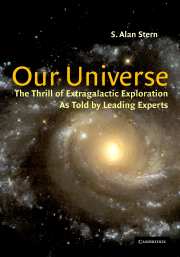Book contents
- Frontmatter
- Contents
- Preface
- The frontier Universe: At the edge of the night
- Part I Revealing a Universe
- Part II Denizens of the deep
- 5 The search for very massive black holes
- 6 Gamma-ray bursts—the most spectacular fireworks
- 7 Clusters of galaxies and the fate of the Universe (Or how to be a cosmologist without really trying)
- 8 Dark matter and the discovery of galactic halos
- 9 Hunting the elusive invisible galaxy
- Plate section
5 - The search for very massive black holes
Published online by Cambridge University Press: 03 September 2009
- Frontmatter
- Contents
- Preface
- The frontier Universe: At the edge of the night
- Part I Revealing a Universe
- Part II Denizens of the deep
- 5 The search for very massive black holes
- 6 Gamma-ray bursts—the most spectacular fireworks
- 7 Clusters of galaxies and the fate of the Universe (Or how to be a cosmologist without really trying)
- 8 Dark matter and the discovery of galactic halos
- 9 Hunting the elusive invisible galaxy
- Plate section
Summary
Ask an astronomer to name a theorist who observes, or vice versa, and Doug Richstone's name is sure to come up. Doug's first flirtations with astronomy resulted from a childhood fascination with the colors of stars in Orion. Despite a bicoastal education at Caltech and Princeton, he flourishes in the midwest as Professor of Astronomy at the University of Michigan. Doug is fond of saying that a busy research and teaching schedule, and too many committee trips, leave him little time for reading, hiking, and recreational travel. Despite this, he has accomplished something wonderful for this book: a fascinating essay describing the slow but nevertheless dramatic revolution in thinking about massive black holes and their role in the evolution of galaxies. In this essay Doug combines two of his career-long fascinations—the dynamics of stars and the nature of quasars—with his enjoyment of team play, to explore the black holes that lie at the center of so many galaxies.
When Alan Dressler called me in 1984, massive black holes were not on my agenda. I had known Alan since the mid-seventies when we were postdoctoral fellows, he at the Carnegie Observatories, I at Caltech. Although we hadn't worked together, his thesis, which included great observational work on clusters of galaxies, was very germane to the theoretical work I had done in my thesis, so I thought he chose good problems and did them well.
- Type
- Chapter
- Information
- Our UniverseThe Thrill of Extragalactic Exploration, pp. 73 - 88Publisher: Cambridge University PressPrint publication year: 2001



